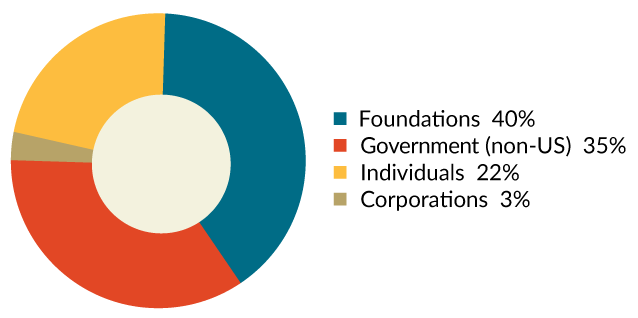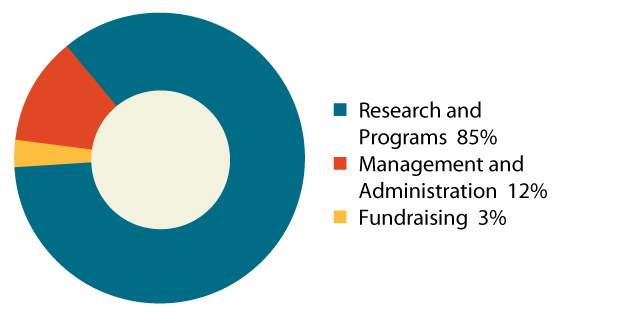This page works best on modern browsers with JavaScript enabled
Annual Report 2014
To all our supporters: a heartfelt thank you for your commitment to our work and your intellectual engagement in our research. It’s with your help that practical ideas for global prosperity are now reaching more people in more ways than ever before.

Dear friends,
Each year, as we prepare the Annual Report, I look back with immense gratitude and much amazement at the accomplishments that CGD’s supporters, board members, staff, and engaged followers make possible. This year is no different. My thanks to all of you. Your support helps us make a real difference—even a globally significant difference—on tough development challenges around the world.
In 2014 we continued to nurture new ideas and promote international cooperation on issues such as climate change, poor schooling, energy poverty, trade barriers, immigration restrictions, inefficient global health programs, and money laundering and tax avoidance. We generated cutting-edge work on all these topics and more; you can find details in this report.
In pursuing our mission of reducing poverty and inequality in the world we are guided by our exceptional board of directors. In 2014 we expressed our deep gratitude to Ed Scott for his leadership and support as board chair since our founding in 2001. We also gave a warm welcome to his successor Larry Summers, who is continuing the tradition of a chair who pushes us to think bigger and do better.
Looking ahead, we can all expect great things from the Center in 2015: new work on women’s empowerment, on global health success stories, on more transparent and just use of natural resource revenues, and on the vital link between tropical forests and development. We will also be issuing a major series of papers that offer a practical, 21st-century development approach for the next US president.
I invite you now to take a moment to enjoy this report. It’s a small window into some of the work made possible by support for CGD. That work is far from over, but I remain ambitious and optimistic in pushing for practical solutions for shared prosperity; after all, development is a win-win proposition—a better world for today’s poor and vulnerable promises a better world for all of us.
Best wishes,

Nancy Birdsall
President
Ideas to Action
It may be our tagline, but CGD’s model really works: independent research and practical ideas for global prosperity. We measure success not in reports read or webpages viewed, but in terms of influence and impact. Here are a few key examples from 2014.
Development Impact Bonds (DIBs)
Development Impact Bonds fund development programs up front with money from private investors, who stand to earn a return (paid by a donor) if the program is successful. The idea was developed by working group jointly led by CGD and Social Finance UK. At CGD this work was led by Owen Barder and Rita Perakis. The first DIB was launched in June 2014 to bring quality education to girls in Rajasthan, India, as a result of a partnership of Instiglio, The Children’s Investment Fund Foundation, Educate Girls and UBS Optimus Foundation. We anticipate that more organizations will adopt this innovative mechanism to finance development.
 The Educate Girls Development Impact Bond. Credit: DFID
The Educate Girls Development Impact Bond. Credit: DFIDThe Tropical Forests for Climate and Development Initiative
This major research project, involving more than 20 commissioned peer-reviewed papers, demonstrates how vital healthy forests are to the climate and to development. The team presented their findings before high-level policymakers at the UN COP20 conference in Lima, Peru. In 2015 their work will be published in the book Why Forests? Why Now?
 Halting and reversing deforestation could mitigate up to 30 percent of the planet’s total carbon emissions. Credit: CIFOR
Halting and reversing deforestation could mitigate up to 30 percent of the planet’s total carbon emissions. Credit: CIFOR Expansion of the Power Africa Initiative
In 2014 the White House announced a tripling of electricity generation targets under President Obama’s Power Africa Initiative, aimed at driving development by increasing access to affordable energy. This increase reflected research by CGD experts Todd Moss and Ben Leo on how to close the energy poverty gap and followed our work in shaping the Power Africa Initiative. During the US-Africa Leaders Summit in August, CGD experts were widely consulted and quoted by international media, drawing on our ideas to make the United States a reliable partner for cost-effective, development-friendly energy policies.
 Roughly 600 million people in Africa live without access to any power, which means no access to safer and healthier electric cooking and heating, no powered health centers or refrigerated medicines, no light to study by at night, and no electricity to run a business. Credit: Greg Marinovich/Bloomberg
Roughly 600 million people in Africa live without access to any power, which means no access to safer and healthier electric cooking and heating, no powered health centers or refrigerated medicines, no light to study by at night, and no electricity to run a business. Credit: Greg Marinovich/BloombergDelivering a Data Revolution
The UN has proclaimed more complete and accurate data to be an essential part of achieving sustainable development goals. In 2014 CGD’s Amanda Glassman and Justin Sandefur led extensive research in this area. Recommendations of a working group conducted in collaboration with the Nairobi-based African Population and Health Research Center were reflected in the UN’s A World That Counts report and featured in the OECD’s Informing a Data Revolution report. In 2015 global decision-makers continue to draw on CGD proposals as they prepare for the major development conferences this year.
 Only 12 of the 54 African Union countries have autonomous national statistics offices (NSOs). NSOs that lack independence often succumb to limited resources, political interference, and complicated vetting processes from other government agencies. Credit: Julien Harneis
Only 12 of the 54 African Union countries have autonomous national statistics offices (NSOs). NSOs that lack independence often succumb to limited resources, political interference, and complicated vetting processes from other government agencies. Credit: Julien HarneisThe Global Development Council
President Obama’s new Global Development Council was deeply influenced by CGD’s Rethinking US Development Policy work. The agenda at the Council’s April meeting was packed with CGD ideas, including recommendations to unleash the Overseas Private Investment Corporation, create a US Development Bank, apply Cash on Delivery Aid in foreign assistance, and publish subcontractor data. This impact was not a one-time deal; CGD’s research, led by Ben Leo, will likely feature heavily in the Council’s 2015 report—a sign of our growing reputation among policymakers at the highest level.
 President Obama’s Global Development Council’s proposals for advancing sustainable growth and development echoed several CGD recommendations. Credit: Pete Souza/White House
President Obama’s Global Development Council’s proposals for advancing sustainable growth and development echoed several CGD recommendations. Credit: Pete Souza/White HouseMitigating the Economic Impact of Ebola
With death, panic, and economic collapse gripping West African nations, the World Bank urgently sought the expertise of CGD’s Mead Over in calculating the long-term cost of Ebola on Africa’s economy. Later, US Senator and Chair of the African Affairs Subcommittee Jeff Flake and Liberia’s Minister of Public Works Gyude Moore (a former CGD Scott Fellow) participated in a CGD event examining how to rebuild economies and strengthen disease surveillance and rapid response, demonstrating CGD’s place at the forefront of policy work on health-related global goods.
 A Nigerian port health official uses a thermometer on a passenger at the arrivals hall of Murtala Muhammed International Airport in Lagos, Nigeria. Credit: AP
A Nigerian port health official uses a thermometer on a passenger at the arrivals hall of Murtala Muhammed International Airport in Lagos, Nigeria. Credit: AP Mead Over (pictured with Liberian Minister of Public Works Gyude Moore) contributed to a timely World Bank report outlining the economic impacts of Ebola.
Mead Over (pictured with Liberian Minister of Public Works Gyude Moore) contributed to a timely World Bank report outlining the economic impacts of Ebola. Jonah Busch, Frances Seymour, and Michele de Nevers lead a major research project on the science, economics, and politics of tropical forests and development.
Jonah Busch, Frances Seymour, and Michele de Nevers lead a major research project on the science, economics, and politics of tropical forests and development. Owen Barder led the working group on Development Impact Bonds, a new financing mechanism that hinges on results and increases the efficiency of programs.
Owen Barder led the working group on Development Impact Bonds, a new financing mechanism that hinges on results and increases the efficiency of programs. In March 2014 Todd Moss testified in front of the House Energy and Commerce Subcommittee on Energy and Power about energy access in the 21st century.
In March 2014 Todd Moss testified in front of the House Energy and Commerce Subcommittee on Energy and Power about energy access in the 21st century. Senior fellow Ben Leo (pictured testifying before the US Senate Foreign Relations Committee) directs the Rethinking US Development Policy initiative.
Senior fellow Ben Leo (pictured testifying before the US Senate Foreign Relations Committee) directs the Rethinking US Development Policy initiative. CGD’s Amanda Glassman and African Development Bank President Donald Kaberuka discuss ways to address the need for timely, accurate, and open data in Africa.
CGD’s Amanda Glassman and African Development Bank President Donald Kaberuka discuss ways to address the need for timely, accurate, and open data in Africa.Stay up to date with all of CGD’s work with our weekly newsletter.
How We’re Funded
In 2014 we continued to set the bar for transparency and accountability, earning the highest rankings possible from Transparify and Charity Navigator.

CGD is funded by contributions from foundations, bilateral agencies, corporations, and individuals. A complete list of our supporters can be found on the our How We’re Funded page, which also provides information on all grants and donations greater than $100,000.

Support CGD
You can invest in shared prosperity by supporting CGD today.
2014 Audited Financials
(includes CGD Europe which began independent operation as a registered UK charity)
Revenue
(unrestricted)
Total = $14.2 million

Expenditures
Total = $14.4 million

Center for Global Development What We Do and What We've Done
We work to change the policies and practices of rich countries and powerful institutions to reduce global poverty and inequality. The independent, rigorous research of our world-class scholars creates new knowledge and policy innovations, and through proactive engagement with the policy community we turn that research into practical ideas for global prosperity. We’re honored that decision-makers look to us as a go-to destination for development solutions and that our work has been influential in creating real change in the world. Here are just a few examples:
- Advance Market Commitments for vaccines: CGD’s proposals led five countries and the Bill and Melinda Gates Foundation to pledge $1.5 billion as an incentive for the development of vaccines for diseases that kill children in poor countries.
- Cash on Delivery Aid: Our proposals to make aid more effective by paying for outcomes continue to set the trend in development. The United Kingdom funded a $10 million pilot in Ethiopia, followed by another in Rwanda.
- Shaping the G-20 Agenda: CGD research on increasing access to financial services for the global poor was closely mirrored by the Principles for Innovative Financial Inclusion document adopted by the 2010 G-20 Summit in Toronto.
- Haiti immigration policy: Two years after the devastating earthquake in Haiti, CGD helped bring about a change in US visa rules to allow Haitians to come to the United States as temporary workers, increasing their earnings tenfold and helping their families back home.
- Commitment to Development Index: Every year CGD calculates and publishes a ranking of rich countries according to how development-friendly their policies are across a range of areas, including aid, trade, finance, and migration. Currently 27 countries are included, allowing us to compare how the policies of the world’s richest economies affect the poor.
Since 2001 we’ve worked hard to build a reputation as an independent, nonpartisan ‘think-and-do’ tank. We value integrity, hard work, and data, data, data! Our funding sources are transparent and diverse, and we are extremely grateful for the growing network of supporters who share our goal: to deliver evidence-based analysis and constructive policy proposals that create opportunities for the world’s poor to enrich and improve their lives.

